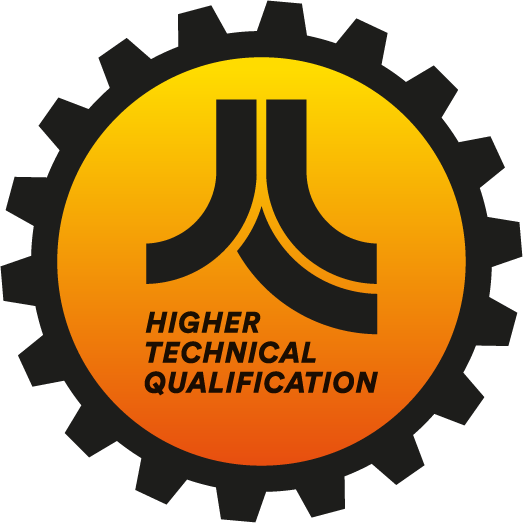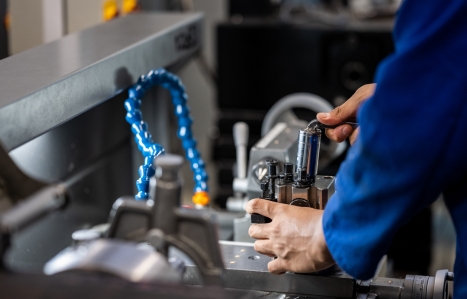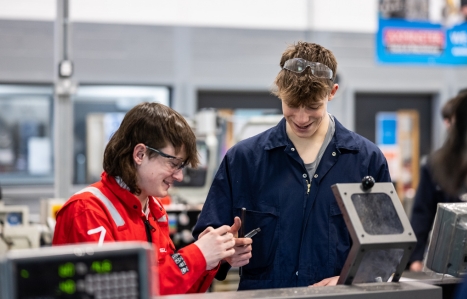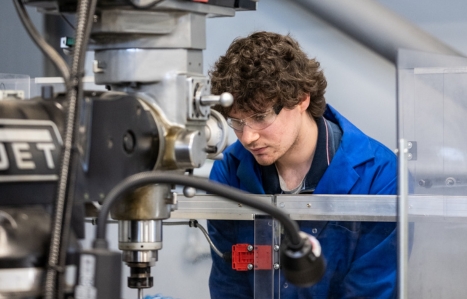Higher National Certificate (HNC) in Manufacturing Engineering for England (HTQ)
The HNC programme in Manufacturing Engineering for England has been developed to assist those looking to develop a career in a modern manufacturing environment.
Course Information
- Course Type Adult - Professional
- Subject Area Engineering and Manufacturing - HTE
- Qualification Higher National Certificate (HNC)
- Study Mode: Full Time or Part Time
- Course Level Level 4
- Location Future Skills Centre
- Course Length One year (full time) or Two years (part time)
- Start Date September, Yearly
- Day Two days per week (full time) or One day per week (part time)
- Fee £8,195 per academic year (full time), £4,098 per academic year (part time)
- Reduced Fee
See below
- Course Code 3D7C

- Overview
-
Click here to view our Fees and Funding Course Information.
The Higher National Certificate (HNC) in Manufacturing Engineering is designed for those looking to build a successful career in a modern manufacturing environment. This Level 4, university-level qualification has a strong vocational focus, providing industry-relevant knowledge, skills, and understanding to help you excel in the field.
Nationally recognised by employers, the HNC is an excellent option for individuals already working in the sector who want to enhance their expertise while balancing work and study. It offers a practical, cost-effective alternative to a full university degree and is equivalent to the first year of a full time university-level programme.
You could progress on to our Higher National Diploma (HND) in Manufacturing Engineering (HTQ).
This qualification is awarded by Pearson Edexcel.

This course is a Higher Technical Qualification (HTQ). HTQs are technical qualifications that have been developed by employers and awarding bodies so students can develop the skills that employers want.
The Level 4 units lay the foundation of learning by providing a broad introduction to the engineering sector as well as a focused introduction to manufacturing engineering. This develops and strengthens core skills while preparing students for more specialist subjects at Level 5 or to enter employment with the qualities necessary for job roles that require some personal responsibility. Students will gain a wide range of scientific and engineering knowledge linked to practical skills obtained through research, independent study, directed study and workplace scenarios. Students are involved in vocational activities that help them to develop behaviours (the attitudes and approaches required for a competence) and transferable skills.
The full time course from Sept 2024 will cover all the topics listed below in one year, and there is also a part time option to do the course over two years.
Core Units
Unit 4001: Engineering Design [1st Year study]
- Create a design specification for a given design brief that meets stakeholder’s requirements, along with a proposed design solution.
- Analyse possible technical solutions to implement the proposed design specification.
- Produce a design report considering all key aspects including manufacturability (or design for manufacturing and assembly) and environmental impact.
- Present the design solution to an audience, including evaluation of feedback and future improvements.
Unit 4002: Engineering Maths [1st Year study]
- Apply a variety of mathematical methods to a range of engineering and manufacturing sector problems.
- Investigate applications of statistical and probability techniques to interpret, organise, and present data.
- Use analytical and computational methods for solving engineering and manufacturing sector problems by relating sinusoidal wave and vector functions to their respective applications.
- Examine how differential and integral calculus can be used to solve engineering and manufacturing sector problems.
Unit 4004: Managing a Professional Engineering Project [1st Year study] Note: This is a Pearson-set unit.
- Select a project that will provide a solution to an identified engineering/manufacturing problem.
- Conduct planned project activities to generate outcomes which provide a solution to the identified engineering/manufacturing problem.
- Produce a project report analysing the outcomes of each of the project processes and stages.
- Present the project report drawing conclusions on the outcomes of the project.
Unit 4014: Production Engineering for Manufacture [1st Year study]
- Illustrate the role and purpose of production engineering and its relationship with the other elements of a manufacturing system.
- Describe the most appropriate production processes and associated facility arrangements for manufacturing products of different material types.
- Analyse how a production system can incorporate a number of different production processes for a given product or assembly.
- Explore the effectiveness of a production system in terms of its operation within the wider manufacturing system.
Unit 4017: Quality and Process Improvement [2nd Year study]
- Examine the applications of statistical process control when applied in an industrial environment to improve efficiency.
- Analyse cost effective quality control tools
- Determine the role of standards in improving efficiency, meeting customer requirements, and opening up new opportunities for trade.
- Analyse the importance of Total Quality Management and continuous improvement in manufacturing and service environments.
Specialist Units:
Unit 4023: Computer Aided Design and Manufacture (CAD/CAM) [2nd Year study]
- Describe the key principles of manufacturing using a CAD/CAM system.
- Prepare 3D solid models of a component suitable for transfer into a CAM system.
- Use CAM software to generate manufacturing simulations of a component.
- Produce a dimensionally accurate component on a CNC/AM machine using a CAD/CAM system.
Unit 4030: Industry 4.0 [2nd Year study]
- Discuss the key concepts and principles of Industry 4.0
- Review the range of cyber-physical production systems (CPPS) shaping Industry 4.0 and their integration with the Industrial Internet of Things (IIoT)
- Explore the implications and impacts of Industry 4.0 in engineering and manufacturing processes and technologies.
- Examine the factors manufacturers need to consider when transitioning to Industry 4.0 and workforce Implications.
Unit 4068: Industrial Robots [2nd Year study]
- Describe the operational characteristics, selection criteria and applications of industrial robots within manufacturing industries.
- Explain the safety standards associated with industrial robots.
- Program an industrial robot for automated process application.
- Investigate the global economic scope of industrial robots and integration into smart factories.
Assessment:
You will be assessed through examination as well as written and practical assignments that cover the learning outcomes assigned to each unit and are completed with direction from, and with formative assessment by, tutors.
Click here to view the Student Handbook for this course.
View the full qualification specification here.
- Entry Requirements
-
You will need 64 UCAS tariff points (minimum) from AS, A Level or AVCE programmes which includes Mathematics and Physics, BTEC National Diploma/Certificate/Extended Diploma including at least merits in Mathematics and EEP, GNVQ Advanced, an Access qualification or other qualifications deemed equivalent to the above. Apprentices on the 120 credit Diploma in addition should have gained at least a pass in Level 3 Unit 28 Further Mathematics. Consideration will be given to mature applicants who have substantial relevant industrial experience – an interview will be required. GCSE Maths and English is required at grade C (or 4) or above (or equivalent O Level).
Please be aware that Exeter College does not hold a CAS licence, and therefore is unable to consider applications from prospective learners who require a Student Visa. Non-UK nationals can be considered for courses as long as they already hold the Right to Study in the UK for purposes other than education.
- Facilities
-
You will be studying at the Technology and Future Skills Centre, which provide aerospace, engineering and automotive students with up-to-date equipment and learning spaces. Our CAD design suite includes computers running the latest industry software, and the CAM workshop contains CNC machining equipment to give you an understanding of modern automated manufacture. A £3million extension has created an Advanced Engineering Centre to be a UK centre of excellence for robotics, and an advanced manufacturing workspace and an electrical/electronic workspace.
Teaching staff:
- Gary Herrington
- David Symes
- Mike Jory
- George Granton
- Kevin Pavey
- Mike Daniels
- Mark Brooking
- Steven Upham
- Additional Costs
-
You are required to purchase some of the recommended books to aid self-study. All students need to have basic drawing equipment (protractors, rulers etc) and a scientific calculator capable of working out complex numbers, vectors and matrices.
-
Have a question?
If you have questions or would like to speak to someone, our team of Customer Service Advisers can help answer your questions or direct your enquiry to the correct team.
Speak to us today on 01392 400500 or send us a message using our contact form: www.exe-coll.ac.uk/contact. -
Ready to find out more?
Why not come along to one of our open events, a chance to explore our facilities, ask questions about our courses and find out more about being a student at Exeter College. Visit our open events page to find out more today.
You may also like View all Level 4 Courses View all Engineering and Manufacturing - HTE Courses
-

Higher National Diploma (HND) in Mechanical Engineering (HTQ)
- Level: Level 5
- Duration: One year (full time) or Two years (part time)
-

Higher National Certificate (HNC) in Mechanical Engineering for England (HTQ)
- Level: Level 4
- Duration: One year (full time) or Two years (part time)
-

Higher National Diploma (HND) in Manufacturing Engineering (HTQ)
- Level: Level 5
- Duration: One year (full time) or Two years (part time)
